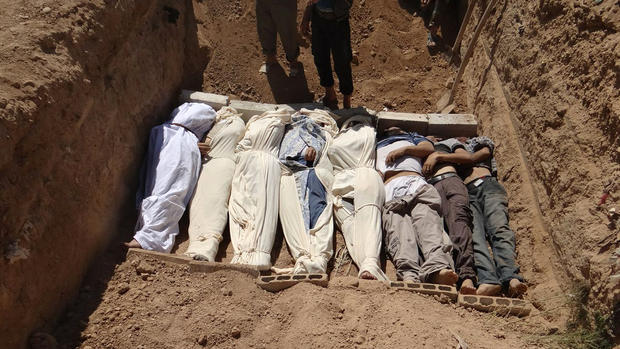Russia says talks with U.S. on Syria chemical weapons resolution "not going smoothly"
Russia's deputy foreign minister said Tuesday that negotiations between Moscow and the U.S. to craft a United Nations resolution aimed at ridding Syria of chemical weapons were "not going smoothly," and that there was no guarantee the deal would be agreed this week.
"Unfortunately it's necessary to note that in contacts with the Americans, things are not going so smoothly ... they are not quite going in the direction they should," Ryabkov told members of Russia's parliament, according to the Reuters news agency.
The primary sticking point in the talks -- which has been the sticking point since the U.S. and Russia agreed the framework of the deal at a meeting weeks ago in Geneva -- is the strong desire by the Obama administration and its allies in Europe to have language in the resolution which provides for punishment of the Syrian regime should it fail to abide by the resolution's terms.
In Geneva, Russia managed to get Washington to agree in principle to a resolution not drafted under the U.N. charter's Chapter 7, which carries the prospect of possible military force if the resolution's terms are violated.
"Attempts of the Americans, actively supported by the English and French, to push the U.N. Security Council to craft a resolution that would contain a direct danger to Syria look absolutely illogical," said Ryabkov on Tuesday.
"There is no talk of adopting a U.N. Security Council resolution under Chapter 7 of the U.N. charter. There can be no talk of any automatic application of sanctions, let alone the use of force," said the deputy foreign minister, reiterating his government's stance that punitive measures can only become an option if and after the initial resolution's terms are violated "by refusal to cooperate, failure to fulfill one's obligations or if anyone, whoever it may be, uses chemical weapons" again.
Russia, Syrian President Bashar Assad's most valuable international ally, remains at odds with the U.S., France and Britain over which side in the bloody Syrian conflict was to blame for a mass-chemical weapons attack on the Damascus suburbs on Aug. 21.
Assad has said it was rebel fighters who used the poisonous gas that killed somewhere between 900 and 1,400 people that morning, and Russia insists that scenario is plausible, while Washington has been convinced for weeks that the attack could only have been carried out by Assad's own military.
A team of about 20 U.N. inspectors spent three days gathering evidence in Damascus' eastern Ghouta suburbs after the attack and published a report which the U.S. and its allies deemed conclusive proof that Assad's regime was behind the attack. Russia dismissed the report as "politicized, preconceived and one-sided."
The U.N. confirmed Tuesday in a written statement that the U.N. inspectors, led by Swedish scientist Ake Sellstrom, would return to Damascus on Wednesday to continue their investigations, focusing on other alleged chemical weapons attacks in Syria which were reported months earlier.
The other sites, one of which is in the suburbs of the northern city of Aleppo, were meant to have been the focus of the inspection team's first mission to Syria, but they were in the country when the Ghouta attack occurred and quickly changed their mandate to assess the far-fresher evidence at hand.
Russia and Syria have argued that the U.S. and its allies jumped to quickly to their conclusions that Assad's military was behind the Ghouta attack, and that evidence from the other alleged chemical weapons incidents -- all of which have been much smaller -- will support their claim that rebel fighters do have access to and the ability to use lethal toxins, including sarin gas, which was used in Ghouta.
